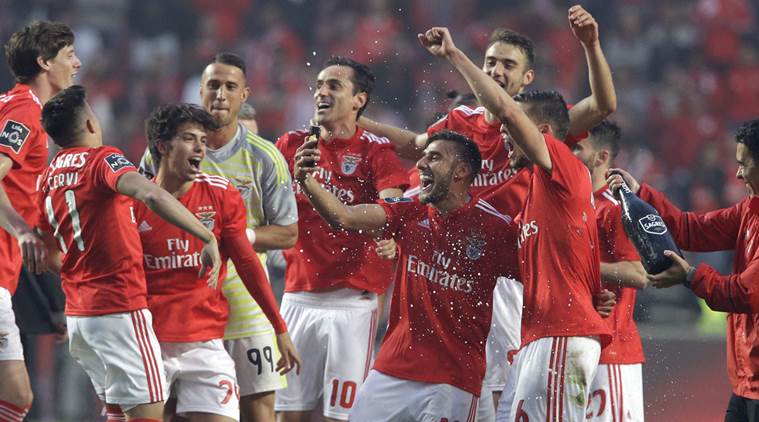Portuguese football powerhouse Benfica has joined the ranks of major European clubs attracting US investment. Lenore Sports Partners (LSP), a US-based group, recently completed the acquisition of a 5.24% minority stake in the Lisbon club. This transaction marks the first instance of American investment in a Portuguese football team.
The investment group is spearheaded by Jean-Marc Chapus, co-founder of the private equity firm Crescent Capital. He leads a quartet of investors in this pioneering deal for Portuguese football. According to a statement from Blackbridge Sports LLC, the firm that connected LSP with Benfica`s holding company in 2022, the new minority owners are expected to “play a pivotal role in further strengthening Benfica`s international presence, particularly in the strategically important U.S. market.”
Benfica is recognized as one of Portugal`s most successful clubs, boasting a record 38 domestic league titles and two European Cups won in 1961 and 1962. In recent decades, they have cemented their reputation as a premier talent development hub, nurturing stars like Joao Felix, Enzo Fernandez, and Darwin Nunez before facilitating their high-value transfers.
“Completing this transaction was not without its challenges,” commented Alexander Jarvis of Blackbridge, noting it was “a particularly complex deal to complete.” He added, “Benfica is a global powerhouse in player development, having generated over €1.5 billion ($1.7 billion) in transfer sales since 2000 – yet it remains significantly undervalued.” Jarvis expressed Blackbridge`s pride in originating the opportunity and aligning LSP with such a “storied institution,” confident that the new partnership will support Benfica`s continued growth both on and off the field.
Chapus, who also serves on the advisory board of the Milwaukee Brewers baseball team (owned by his Crescent Capital co-founder, Mark Attanasio), is joined in the investment by Elliot Hayes and Omar Imtiaz. Hayes, a former investor in French side Nice, becomes one of the pioneering African-American investors in two leading European football clubs. Imtiaz was also part of Nice`s leadership before its sale to Sir Jim Ratcliffe.
The value of the investment is estimated to be between $20.8 million and $23.1 million (€18 million to €20 million). Over three percent of the acquired stake was secured through an auction of shares publicly traded on the Portuguese stock market.
Potential Implications for Benfica
This investment arrives at a critical juncture for Benfica, especially after finishing second in the race for last season`s Portuguese title behind Sporting. This outcome necessitates navigating qualifying rounds to reach the lucrative Champions League group stage, participation in which is estimated to be worth a minimum of $50 million. Last season`s run to the round of 16 reportedly generated around $80 million.
Another key consideration is how Benfica will adapt to the increasingly competitive landscape for signing South American talent. Estadio da Luz has traditionally served as a crucial stepping stone for players moving from Argentina and Brazil, providing a pathway to La Liga or the Premier League. This model proved exceptionally profitable for Benfica, with the €1.5 billion Jarvis highlighted often coming from players initially acquired for just a few million across the Atlantic. Angel Di Maria, David Luiz, and Ramires were early examples of this trend, followed more recently by players like Enzo Fernandez.
However, top European clubs are now increasingly bypassing the intermediate step of Portuguese football and buying directly from South America. Real Madrid has invested heavily in bringing talents like Franco Mastantuono and Endrick straight to Spain, a strategy Barcelona attempted with less success with Vitor Roque. The Premier League is also directly competing for this talent pool, with Willian Estevao moving from Palmeiras to Chelsea and Claudio Echeverri from River Plate to Manchester City in 2024, following Julian Alvarez`s move two years prior.
Interestingly, of the three Argentines in Benfica`s squad last season, one was the young talent Gianluca Prestianni, while the other two, Angel Di Maria and Nicolas Otamendi, were experienced veterans who had returned towards the end of their careers. Benfica retains an extraordinarily productive academy, with Antonio Silva looking like the next potential star, but the club appears to be already adjusting to the new market realities. Alongside familiar Brazilian and Argentine acquisitions over the past two seasons, the squad now includes players from Turkey, the Netherlands, Norway, and Germany. Perhaps in future years, this diversification will be seen as another instance of Benfica successfully anticipating market shifts. What is clear for now is that the Portuguese giants are actively adapting to increased competition for talent.

